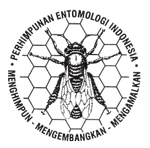Aktivitas minyak dan serbuk enam spesies tumbuhan terhadap peneluran dan Mortalitas Callosobruchus sp. (Coleoptera: Bruchidae)
DOI:
https://doi.org/10.5994/jei.3.2.59Keywords:
Callosobruchus sp., mortality, oviposition deterrence, plant oil, plant powderAbstract
Storage pests remain one of the main problems in storage. The pest attacks occur not only in the field, but also in storage. Control should be done to maintain the quality of storedproducts. The environmentally friendly measures should be implemented to avoid negative impacts to the environment and human being. The objective of this research was to study the mortality and oviposition deterrence caused by powder and oil of six plant species against Callosobruchus sp. (Coleoptera: Bruchidae). Flowers of Eugenia aromatica, roots of Vetiveria zizanioides, leaves of Pogostemon cablin, seeds of Ricinus communis, seeds of Foeniculum vulgare, and stems of Cymbopogon citratus were air-dried and milled to yield powder. Oil of six plant species were purchased from local market. Oviposition deterrent bioassay was conducted by no-choice method for both powder and oil, while mortality bioassay was conducted by topical application and residual methods for plant oil only. Several plant species showed high biological activity to Callosobruchus sp. Powder of E. aromatica and oil of V. zizanioides caused high oviposition deterrence, while oil of V. zizanioides and E. aromatica caused high mortality.Downloads
Downloads
Published
How to Cite
Issue
Section
License
Authors who publish with this journal agree to the following terms:
- Authors retain copyright and grant the journal right of first publication with the work simultaneously licensed under a Creative Commons Attribution 4.0 International License that allows others to share the work with an acknowledgement of the work's authorship and initial publication in this journal.
- Authors are able to enter into separate, additional contractual arrangements for the non-exclusive distribution of the journal's published version of the work (e.g., post it to an institutional repository or publish it in a book), with an acknowledgement of its initial publication in this journal.
- Authors are permitted and encouraged to post their work online (e.g., in institutional repositories or on their website) prior to and during the submission process, as it can lead to productive exchanges, as well as earlier and greater citation of published work (See The Effect of Open Access).








